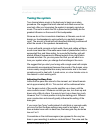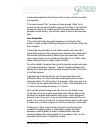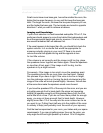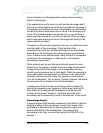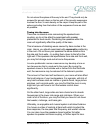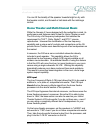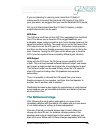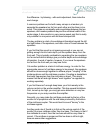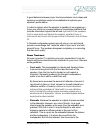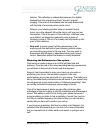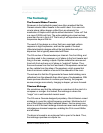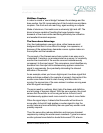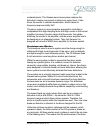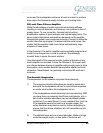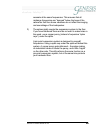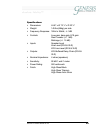
Genesis 5.3 Owners Manual Ver 2.2
16
~ÄëçäìíÉ=ÑáÇÉäáíó™
A good balance between proper low bass extension and a deep and
spacious soundstage needs to be established to optimize your
speaker's performance.
In order to achieve what the speaker is capable of we suggest you
focus your efforts on a proper balance of soundstage elements that
includes information beyond the left and right sides of the speakers,
front to back depth well behind the speaker, excellent focus of
instruments and voices with proper vertical information and mid bass
fill.
A Genesis loudspeaker system correctly set up, can and should
provide a soundstage that “melts the walls of your room” and with
pinpoint focus. The speakers disappear completely on a recording
that has such quality.
Room Treatment
No room is perfect. To optimize your sonic presentation it may be
helpful add some minimal acoustic treatment to your room. Here are
some guidelines:
1. Front walls. This loudspeaker is a dipole and therefore there
is sound coming from both the front and the back of the
speaker. How the front wall is treated or not treated is
important. Generally speaking, the Genesis loudspeakers
prefer a live front wall to a dead front wall.
By these terms we mean the amount of reflection of sound. A
typical wall of glass or, brick, cement or drywall material is a
reflective surface. A heavily curtained or sound absorbent
wall would be considered a "dead wall" or a non-reflective
wall. A normal thin curtain across a window causes only a
small amount of absorption. Hence, a curtained glass window
would just be about perfect.
2. Sidewalls. Because the speaker is a dipole it is less sensitive
to the sidewalls. However, as a rule of thumb, it is a good
idea to keep the speaker as far away from the sidewalls as is
practical. With this in mind, it may be helpful to add some
damping material or diffuser panels to the point of first
reflection. This is a point on the sidewalls between the listener
and the loudspeaker. It is where the sound from the
loudspeaker first hits the sidewall, then bounces to the



